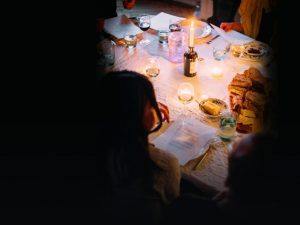Jonathan Beckman in 1843 Magazine:
 The marriage of sated appetites and adventurous conversation has a long history. In Ancient Greece, philosophical discourses were washed down with jugs of wine at banquets known as symposia. There was always a risk that some people would over-indulge. In the most famous description of a symposium, Plato describes how the guests, who included Socrates and Aristophanes, were expounding on the nature of love when they were interrupted by the arrival of a boozed-up general, Alcibiades. Table talk was considered an art to be mastered. Athenaeus, a Greek grammarian of the third century AD, wrote a 15-volume work entitled Deipnosophistae (“The Learned Banqueters”) about a series of dinners in which conversation ranged from philology to homosexuality.
The marriage of sated appetites and adventurous conversation has a long history. In Ancient Greece, philosophical discourses were washed down with jugs of wine at banquets known as symposia. There was always a risk that some people would over-indulge. In the most famous description of a symposium, Plato describes how the guests, who included Socrates and Aristophanes, were expounding on the nature of love when they were interrupted by the arrival of a boozed-up general, Alcibiades. Table talk was considered an art to be mastered. Athenaeus, a Greek grammarian of the third century AD, wrote a 15-volume work entitled Deipnosophistae (“The Learned Banqueters”) about a series of dinners in which conversation ranged from philology to homosexuality.
In 18th-century France, the sharpest minds of the Enlightenment sparred in the salons of their aristocratic hostesses. Intellectual combat was a prerequisite of socialising. Over the last few years, there has been a flourishing of literary salons in London. These tend to be considerably less sharp-tongued then their precursors – often, they simply involve soft-ball interviews of authors with books to sell. But their popularity suggests that there is a demand for conversation that is both stimulating and intimate. The harder people work, the less often they see their friends and the more time they must devote, when they do, to a recitation of the chronicle of minor triumphs and disappointments known as “catching up”. Then comes gossip, gripes about work and family fortunes. Precious little time is left for truth and beauty. More formal occasions are little better: dinner-party chat can death-spiral with alarming speed into a collective lament over house prices, catchment areas and the intolerable expense of a loft conversion.
More here.
